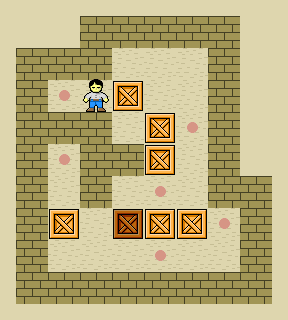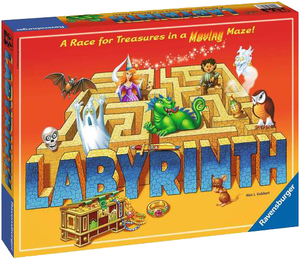
A maze is a path or collection of paths, typically from an entrance to a goal. The word is used to refer both to branching tour puzzles through which the solver must find a route, and to simpler non-branching ("unicursal") patterns that lead unambiguously through a convoluted layout to a goal. The term "labyrinth" is generally synonymous with "maze", but can also connote specifically a unicursal pattern. The pathways and walls in a maze are typically fixed, but puzzles in which the walls and paths can change during the game are also categorised as mazes or tour puzzles.

Sokoban is a puzzle video game in which the player pushes boxes around in a warehouse, trying to get them to storage locations. The game was designed in 1981 by Hiroyuki Imabayashi, and first published in December 1982.
A puzzle is a game, problem, or toy that tests a person's ingenuity or knowledge. In a puzzle, the solver is expected to put pieces together in a logical way, in order to arrive at the correct or fun solution of the puzzle. There are different genres of puzzles, such as crossword puzzles, word-search puzzles, number puzzles, relational puzzles, and logic puzzles. The academic study of puzzles is called enigmatology.
Transport puzzles are logistical puzzles, which often represent real-life transportation problems. The classic transport puzzle is the river crossing puzzle in which three objects are transported across a river one at time while avoiding leaving certain pairs of objects together. The term should not be confused with the usage of transport puzzle as a shortened form of transportation puzzle, representing children's puzzles with different transportation vehicles used as puzzle pieces.

An action-adventure game is a video game hybrid genre that combines core elements from both the action game and adventure game genres.

The Crystal Maze is a British game show devised by Jacques Antoine, based upon his format for the French game show Fort Boyard, and produced for Channel 4. The programme focuses on teams of contestants, a mixed group of men and women, attempting a range of challenges to earn time required to help them complete one final challenge, which if completed successfully earns them a prize. The premise of the show is themed around challenges set to different periods of human history within a fictional labyrinth of time and space, and is notable for the use of golf ball-sized Swarovski glass crystals as a reward for each challenge successfully completed by contestants, and lock-in conditions for contestants that ran out of time or broke a three-strikes rule on a challenge.
In tabletop games and video games, game mechanics are the rules or ludemes that govern and guide the player's actions, as well as the game's response to them. A rule is an instruction on how to play, a ludeme is an element of play like the L-shaped move of the knight in chess. A game's mechanics thus effectively specify how the game will work for the people who play it.
A programming game is a video game that incorporates elements of computer programming, enabling the player to direct otherwise autonomous units within the game to follow commands in a domain-specific programming language, often represented as a visual language to simplify the programming metaphor. Programming games broadly fall into two areas: single-player games where the programming elements either make up part of or the whole of a puzzle game, and multiplayer games where the player's automated program is pitted against other players' programs.

Beyond Zork is an interactive fiction computer game written by Brian Moriarty and released by Infocom in 1987. It was one of the last games in the Zork series developed by Infocom. It signified a notable departure from the standard format of Infocom's earlier games which relied purely on text and puzzle-solving: among other features, Beyond Zork incorporated a crude on-screen map, the use of character statistics and levels, and RPG combat elements.

"Game over" is a message in video games which signals to the player that the game and an attempt of playing the level has ended. It is usually received negatively in a situation where continued play is disallowed, such as losing all of one's lives or failing a critical objective. However, it sometimes also appears after the successful completion of a game, usually ones designed for arcades. The phrase has since been turned into quasi-slang, usually describing an event that will cause significant harm, injury, bad luck, or even death to a person.

Anticipation is a video board game developed by Rare and released by Nintendo for the Nintendo Entertainment System (NES) in 1988. It is playable in either single-player or multiplayer mode, with up to four players competing against each other and/or computer-controlled opponents.
Proof of work (PoW) is a form of cryptographic proof in which one party proves to others that a certain amount of a specific computational effort has been expended. Verifiers can subsequently confirm this expenditure with minimal effort on their part. The concept was invented by Moni Naor and Cynthia Dwork in 1993 as a way to deter denial-of-service attacks and other service abuses such as spam on a network by requiring some work from a service requester, usually meaning processing time by a computer. The term "proof of work" was first coined and formalized in a 1999 paper by Markus Jakobsson and Ari Juels.

Labyrinth is a board game for two to four players, published by Ravensburger in 1986.

A sliding puzzle, sliding block puzzle, or sliding tile puzzle is a combination puzzle that challenges a player to slide pieces along certain routes to establish a certain end-configuration. The pieces to be moved may consist of simple shapes, or they may be imprinted with colours, patterns, sections of a larger picture, numbers, or letters.
Logic mazes, sometimes called mazes with rules or multi-state mazes, are logic puzzles with all the aspects of a tour puzzle that fall outside of the scope of a typical maze. These mazes have special rules, sometimes including multiple states of the maze or navigator. A ruleset can be basic or complex. Popular logic mazes include tilt mazes and other novel designs which usually increase the complexity of the maze, sometimes to the point that the maze has to be designed by a program to eliminate multiple paths.

Puzzle Pirates is a massively multiplayer online game developed by Three Rings Design. The player takes the role of a pirate, adventuring on the high seas and pillaging money from roaming enemy ships. The mechanics of Puzzle Pirates are driven by puzzles. For example, to effectively sail a ship, players must play puzzle games representing work at the sails for speed, pumping bilge water to remove it from the ship, and carpentry to fix any damage the ship may take.

A game is a structured form of play, usually undertaken for entertainment or fun, and sometimes used as an educational tool. Many games are also considered to be work or art.
True Adventures, Ltd., is a role-playing game company started by Jeff Martin. It operates two entertainment venues at Gen Con Indy: True Dungeon and True Dungeon Fantasy Tavern. True Adventures is notable because their signature event, True Dungeon, is "the single most popular event" at Gen Con, drawing people to the convention just for it. The event is also notable for its scale; about 3,000 players play in groups of up to eight people over four days each year. The company also hosted the event True Heroes in 2004 and 2005. True Adventures ran these events at Gen Con SoCal when the convention was still in existence. The company grew out of Martin's work in creating elaborate props and puzzles for his Dungeons & Dragons game.

Indiana Jones in the Lost Kingdom is a puzzle video game developed by Michael J. Hanson and published by Mindscape for the Commodore 64. The game is based on the Indiana Jones series, and was released in North America in late 1984. In the UK, the game was imported and distributed by U.S. Gold.

The Challenge: Australia is the Australian adaptation of the American reality competition series The Challenge. The first season featured twenty-two Australian reality television contestants and celebrities competing against one another in various challenges to avoid elimination.












